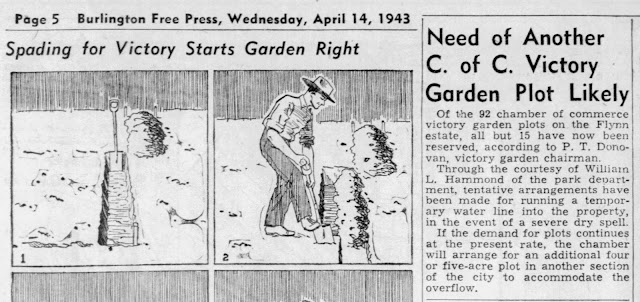BACG History Post #58
The modern era of community gardening in Burlington began in 1972, when the Cliffside Community Garden was established at Oakledge Park. The half-acre community garden was a partnership between the Burlington Parks Department and Gardens for All, a nonprofit initiative based in Charlotte, Vermont.
The United States was still heavily involved in the Vietnam War during 1972. On the home front, the war contributed to higher prices for food, energy, and commodities. Worldwide, a decline in grain production led to food shortages and price spikes.
The Cliffside Community Garden was not the first community garden site in Burlington. Historically, community gardens emerged in Burlington during periods of war and economic uncertainty. Making garden plots available to the public served as a response to food shortages during World War I, the Great Depression of the 1930s, and World War II.
In spring 1943, land was lined up to create more than 300 Victory Garden plots. A Burlington Free Press story reported that garden plots ranging from 25 ft. x 50 ft. to 100 ft. x 50 ft. were planned.
Victory Gardens were located at Mt. St. Mary's Academy off Mansfield Avenue, the Flynn Estate land off Shelburne Road and Flynn Avenue, and the Walter Edlund property off Spear Street.
The Burlington Street Department used sidewalk plow tractors to prepare the land for gardens. Street Department employees were among the Victory Gardeners.
In Burlington's South End, South Park and land around the Baird School were Victory Garden sites. Along North Avenue, the Parks Department leased ten acres of the Arthur Property for Victory Gardens.
The Arthur property was also used for "community war garden plots" during WWI. One hundred and thirty garden plots were created after the meadow was plowed and harrowed.
Community gardeners worked diligently to overcome the crop of witch grass which sprouted in the virgin soil. An infestation of rose bugs swept the city in July, nearly wiping out the garden crops.
A Burlington Free Press article on July 4, 1918 (see below) reported that the city garden committee applied "gallons of poisonous spray" to defeat the swarms of rose bugs which defoliated plants. "A spirit of congeniality and good fellowship" was noted as a "remarkable feature of the entire project."
The article noted that "everybody helps everybody else, and in that way happiness and contentment reign supreme. The gardens are worked from as early as five o'clock in the morning to after dark each night."


